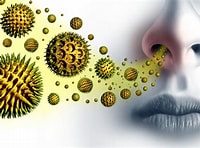
Allergy season is upon us. It has sparked headlines and is the topic of many discussions.
The season has started a bit earlier than normal and has been more intense because of climate change, new research shows.
According to the Centers for Disease Control and Prevention, more than 24 million Americans experience seasonal allergies; it is also referred to as “seasonal allergic rhinitis” or “hay fever.”
The duration of seasonal allergies differs from year to year, and it is highly dependent on the weather. When the weather tends to be warmer and plants bloom earlier in spring and fall, allergy season often lasts longer. Symptoms are known to linger longer depending on the pollen count.
The month of March screams spring in North Florida. Spring allergies may begin to pop up in this month. While tree pollen is most common, weeds and grasses may also begin to bloom. This is when icky yellow pollen begins to cover cars and other outdoor objects.

Wind-driven pollen plays an important role in plant fertilization, and is closely tied to temperature and precipitation changes. So as the spring season gets warmer earlier due to climate change, this helps plants pollinates earlier and for a longer period of time.
Research reported that in the future, different tree pollen varieties will eventually overlap with each other, leading to overall higher concentrations that threaten public health.
In a study published Tuesday in the Journal Nature Communications, it was found that by the end of the century, pollen season could begin as much as 40 days earlier than it has in recent decades in the U.S. due to global warming. Researchers also discovered annual pollen counts could reach up to 250%.
Allison Steiner, author of the study and professor at the University of Michigan, wrote that pollen is something that is on people’s radar because it influences their daily lives if they are allergic.
“A huge component of the population is affected by these allergies, and people are really interested in understanding how their allergies might change so they can manage their symptoms better,” Steiner wrote.
In Tallahassee, residents are noticing the early start to pollen season. Many say it is one of the worst times of the year for them.
Dr. Brian Wilson at Tallahassee Allergy, Asthma and Immunology, said that the most common symptoms with any type of allergy is nasal congestion, sneezing, runny nose, post-nasal drip, and itchy or watery eyes.
“Grass pollen tends to be the one that causes the most trouble for people. Especially in this area,” Wilson said.
“Allergy season is present all-year round, so in reality it’s really not a seasonal allergen. There are variations that tend to be higher in concentration in the spring and summer,” he added.
Florida A&M student Jaszmine Welch describes her allergies as a curse that was given to her.
“My allergies are so bad, it makes it to where I can’t breathe, my eyes are swollen, and I even experience days where my body hurts. Waking up and not being able to breathe makes me feel like I can’t function,” Welch said. “Having to constantly take medicine is annoying.”